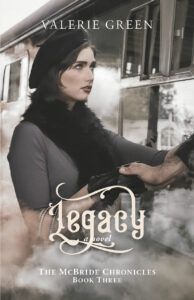Globetrotting historical novels a ‘dynastic tapestry’
Destiny: The McBride Chronicles Book Two
by Valerie Green
Surrey: Hancock House, 2023
$24.95 / 9780888397645
Legacy: The McBride Chronicles Book Three
by Valerie Green
Surrey: Hancock House, 2023
$24.95 / 9780888397669
Reviewed by Vanessa Winn

Following her debut novel, Providence, Victoria writer Valerie Green has deftly spanned two subsequent generations in the second and third books of the McBride Chronicles, Destiny and Legacy. Impressively covering a wider period in shorter volumes, these engaging stories are fast-paced, reflecting the remarkable societal and industrial changes of the late-19th and early-20th centuries.
Destiny traces the friction between matriarch Jane McBride, heroine of Providence, and her rebellious daughter Sarah. Growing up in relative luxury in Victoria, British Columbia, Sarah cannot understand her reticent mother’s concern for maintaining the family’s social standing among the provincial elite. Jane’s reluctance to dwell on the hardship of her past leaves an unsuspecting Sarah to chafe against her mother’s expectation that she should grow up to be a “lady.”
Sarah gleans only intriguing hints about her mother’s past by eavesdropping on her parents or by taunts from a Craigflower schoolmate that her mother had arrived in the colony on a bride ship, insinuating she was a husband-hunting orphan, or worse. Turning to her closest friend Willow, an Indigenous youth, for an explanation, Sarah learns instead that he is already too familiar with the colonial settlement push aided by the bride ships, as well as the price to his people of the epidemics brought by new arrivals.

Green paints some striking portrayals of local landmarks and the societal divisions they represent. Sarah’s parents counter her increasing unruliness by sending her to board weekly at Angela College on Cathedral Hill, “looking down its elegant Anglican nose” toward the town and lower classes. Although her father, Captain Gideon McBride, reconciles her to the decision, Sarah, missing her childhood sweetheart Willow, dreads the strait-laced school.
A friendship with her roommate, Margaret Bowers (dubbed Bowery) makes the school bearable for spirited Sarah. During Bowery’s weekend visits to Providence with Sarah, the events of the times are glimpsed in episodic interludes, such as the installation of the telephone, local political shenanigans, or a visit by Sir John A. and Lady Macdonald to celebrate the transcontinental railway. More significant to Sarah’s story is that Bowery’s long-absent parents agree that their daughter can attend the same “finishing school” in Germany that the McBrides plan for Sarah.
In her acknowledgements, Green credits the Jacob Hunter Todd family, the subjects of her biographical study Excelsior, with inspiring her characters’ educational experiences and early lives. This rich source material gives the fictional story an authentic tone that underpins her novels, particularly in the letters McBride family members write to each other.
Leaving Sarah’s annoying younger twin brothers at Upper Canada College, thereby interrupting a budding romance between twin Teddy and Bowery, the McBrides journey to London to meet Bowery’s titled parents. When Sarah asks her mother if she will look up Lord and Lady Sinclair, among the few she had mentioned from her past, her mother is quick to dismiss the idea. Instead, they are soon absorbed in the sights and festivities for Queen Victoria’s Golden Jubilee in 1887.
Disappointed by the monarch’s appearance, Sarah falls into the popular perception of the queen’s complete seclusion, believing that it was her first public appearance since her 1861 widowhood. This is surprising, since in the interim the monarch was compelled to open parliament to request allowances for her children as they married or came of age, as well as to head a procession for the Prince of Wales’ 1872 thanksgiving service to mark his survival from typhoid, which turned public opinion back in her favour.
This background is a slight historical blip, however. Catching sight of her mother’s yearning for the missed learning opportunities of her youth, particularly for music, Sarah determines to make the best of school. Upon completing her education to become a lady, to appease her mother Sarah undergoes her presentation at court, a feather-plumed spectacle that even Queen Victoria’s children found absurdly funny. The comic element of the preparation is overshadowed by Sarah’s father suffering from an ominous stomach ailment and, at the court, the insinuating manner of Lord Philip Sinclair, son of the lord and lady whom her mother knew in youth.
Although Sarah witnesses the brusque exchange between Lord Sinclair and her father at court, her questions, as often occurs in life, are not immediately answered. It’s not until a relaxing trip to visit Captain McBride’s Scottish family before heading home, that Sarah’s mother is open to revealing a window into her past.
While Destiny can be read as a stand-alone novel, Jane McBride’s story in Providence adds a deeper dimension to these revelations into her fraught youth.
Like many parents, matriarch Jane learns as much from her children as they learn from her. Back home at Providence, friction lingers between mother and daughter, particularly over Sarah’s attraction to the “radical” movement of women’s suffrage. It’s not until the collapse in their Gorge neighbourhood of Point Ellice Bridge, overburdened with holiday streetcars, that Jane sees her daughter’s strengths in a clearer light as she springs into action to aid survivors, and to retrieve the dead.
Ironically, the bridge disaster’s loss of life reinforces the ties between mother and daughter, a bond which they will need faced with the personal ordeals looming ahead. In a coincidental plot twist worthy of a Victorian sensation novel, Sarah encounters a love interest with deep ties to characters in Providence. Here again, there is an added benefit of following the profound connections between characters winding through generations in the novels.
The last third of Destiny is narrated by matriarch Jane McBride, offering her seasoned perspective while trying to protect the family from the aftermath of her daughter’s dark secret.
Through Jane, the author adroitly weaves Sarah’s story together with the secondary characters. Although Green acknowledges that her characters are fictional, there are occasional parallels with real people, such as Chinese servant Ah Foo, who is featured in some of her nonfiction works. Foo’s departure and disappearance with his life savings reflects the mysterious loose ends of life. Green’s deep-rooted research imparts a sense of realism which finely balances the dramatic vein of Destiny.

Carrying through to Legacy, Sarah’s adult life is framed by disasters of different kinds, two involving the unpredictable sea. Although the McBride dynasty was built on the fortunes of her father, a Fraser River boat captain, Sarah’s fate echoes that of her seafaring paternal grandfather. The eventual wreck of the SS Princess Sophia in 1918 offers Sarah a reunion with a man connected to a pivotal, far-reaching moment in her life. These thematic cycles link the generations, providing continuity despite tragic and sometimes ironic losses.
Legacy returns to the narrative structure of Providence, alternating between different characters. In this story, however, the new characters are interspersed with chapters devoted to the viewpoints of Sarah and Jane, providing a cohesive thread to the series. Part One introduces Sarah’s son Stephen, and Letty, great-granddaughter of Edward Caldwell, a life-long friend of the McBrides.

As with Destiny, family trees of both characters appear in the preface, to aid in tracking the generational relationships. This is especially helpful for the supporting roles of the Caldwells, who are less often seen. Letty Caldwell is an exception, vividly sharing the grim arena of war.
The McBride Chronicles are reminiscent of Anthony Trollope’s Chronicles of Barsetshire, where characters emerge to the forefront in one novel, and then recede to a supporting role elsewhere as the focus shifts to other characters. As Trollope was inspired by settings in England’s West Country, Green’s background settings, near and far, are faithful renderings. She provides the added recognition of references to the real, and sometimes prominent, people who populated them, strengthening the historical framework.
The elders of the two families hope for a future marital tie between the younger generation, which seems possible as the childhood attachment of Stephen and Letty grows deeper. The urgency of World War I both interrupts and accelerates their blossoming relationship. Underage, Stephen joins the Canadian Expeditionary Force, while Letty trains to become a nurse and joins the Royal Canadian Army Medical Corps. Reunited during training in England, in their passion and naivety they believe that nothing could separate them.
The absurd endurance tests of training give a strong sense of the hurry-up-and-wait preparations for war, while the jocular camaraderie of the soldiers provides comic relief. Like many in their time, the young couple grasp love in the fleeting moments and months before their divisions are sent to the frontline in France and Belgium.
Stephen finds solace in meeting ill-fated Canadian brigade surgeon and poet John McCrae, shortly before writing his iconic “In Flanders Fields.” Knowing the fate of McCrae adds to the poignancy of such passing friendships. Within two months of battle, Stephen confronts the new horror of chlorine gas warfare in the trenches. His injuries send him, near death, to a Red Cross station in Flanders, where he crosses blood-strewn paths with Letty. Despite the reprieve of Letty’s devoted nursing, the vicissitudes of war send him, only partly recovered, back to the front at the Somme.
In her extensive research, Green drew partly on her own family history to honour and convey the horrendous casualties and loss of life in both World Wars. While she strikingly depicts the chaotic horror, she does not dwell there long. Switching between characters also spares the reader prolonged immersion in war’s most ghastly aspects, unlike the participants, making it less difficult to take in.
As the war gradually grinds to its close, a weary Letty faces another scourge hitting Europe, the Spanish Flu. The pandemic’s spread to North America reconciles her to going home to Victoria. Nursing “Granny Mac,” as the younger generation dub a feisty Jane McBride, helps to heal the young nurse’s psychological scars.
The arrival of an amputee who had fought with Stephen’s division inspires Letty to volunteer at the Craigdarroch Military Hospital, where he is undergoing rehabilitation. Green supplies a potent impression of Craigdarroch Castle’s resurrection from its coal baron past to modern utility, representing the tremendous societal shifts of World War I. For non-local readers, a little more description of the towering baronial castle would have sharpened the contrast of former excesses with massive human loss.
The wreck of the CPR’s SS Princess Sophia on the Inside Passage is eclipsed by the jubilation at the end of the Great War. Amid the impact and recovery of both events, Part 2 shifts narration to Sarah’s youngest son, Cal, who grows up with the extended family of Providence. His passion for the new technology of flying contributes to the expansion of McBride’s Transportation into flying mail between local cities. But Cal has other visions for his path.
As headstrong as his mother, Cal delays his university plans for the opportunity to try his pilot’s hand at barnstorming flights up the Fraser River. Despite, or perhaps because of the depression, he takes those who could afford to on thrill rides in efforts to escape bleak times. Meeting renowned aviator Charles Lindberg on a tour eventually steers Cal back to pursuit of his education, much to the relief of his family. The respite is brief.
Oxford University brings Cal full circle to his grandmother’s beginnings at a local orphanage. There he undertakes a promise to give her support to future orphans, in her birth name, one of several legacies of the book’s title. At Oxford, not surprisingly, he also develops his knack for aeronautical engineering.
Cal’s post-education career of bush flying in the north is interrupted again by the familiar spectre of war. The boding approach of World War II changes his course to head a RCAF flight school on the prairies. But once Germany occupies France and begins bombing Britain, Cal’s English-Scottish roots propel him, like his brother and many before him, to join the war in Europe. This time his own battle is from the skies.
Aided by a talisman his grandmother gives him, Cal’s luck holds through repeated bombing raids against Germany. Between flights, he meets Maggie, an Englishwoman who seems destined to become a war bride. Green’s past research, including the recollections of those for whom this period existed in living memory, evokes a bittersweet nostalgia. The wartime music in the background, such as Vera Lynn’s “I’ll See You Again,” hauntingly conveys the grit and faith of a generation confronting devastation, even while they are shorn of their expectations of war’s glory.
The romance between Cal and Maggie, and a final act by matriarch Jane McBride as her life draws to its close, sets the stage for Green’s Tomorrow, Book Four of The McBride Chronicles. The breadth the author covers in these stories is remarkable. Through Legacy, the hand of fate is hard at work with the blunt strokes of war. While skilfully capturing generations torn apart, Green weaves their stories into a dynastic tapestry, held together by resilient women brought vibrantly to life.
*

Born in London, UK, Vanessa Winn lives in Victoria, where she received a Bachelor of Arts degree in English Literature at the University of Victoria. Her second novel, Trappings (Oakheart Press, 2020), depicts real people and events in mid-19th-century British Columbia, during the aftermath of the gold rushes. It was included as a course textbook in a Public History graduate seminar at UVic. Her debut novel, The Chief Factor’s Daughter (Touchwood Editions, 2009) similarly portrays factually based social history during the Fraser River gold rush and was studied at universities in British Columbia. Her poetry has been published in various journals and she also writes non-fiction. Beyond her passion for the written word and historical research, she also teaches Argentine tango. Please visit her website. [Editor’s note: Vanessa Winn reviewed books by A.S. (Lana) Rodlie and Valerie Green for BCR, and her own book, Trappings, is reviewed here by Valerie Green.]
*
The British Columbia Review
Interim Editors, 2023-25: Trevor Marc Hughes (non-fiction), Brett Josef Grubisic (fiction)
Publisher: Richard Mackie
Formerly The Ormsby Review, The British Columbia Review is an online book review and journal service for BC writers and readers. The Advisory Board now consists of Jean Barman, Wade Davis, Robin Fisher, Barry Gough, Hugh Johnston, Kathy Mezei, Patricia Roy, Maria Tippett, and Graeme Wynn. Provincial Government Patron (since September 2018): Creative BC. Honorary Patron: Yosef Wosk. Scholarly Patron: SFU Graduate Liberal Studies. The British Columbia Review was founded in 2016 by Richard Mackie and Alan Twigg.
“Only connect.” – E.M. Forster
2 comments on “Globetrotting historical novels a ‘dynastic tapestry’”